
Kansas Disability and Health Program News
Spring/Summer 2018
In this issue:
- Greetings from the Director
- Welcome, New Partners
- Advisor Profile: Deb Young Keeps on Rolling
- Stoplight Healthy Living Program a "Go" for Consumers
- How's Your Health Care Access? CHEC Informs Consumers and Providers
- "Feeling Good About Your Smile" Expands to Other Communities
- Have You Liked Us on Facebook?
- Look for Us in Person
Greetings from the Director
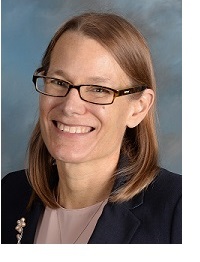 I hope you are all enjoying a good and healthy June! In this semi-annual newsletter, we are pleased to report on recent and upcoming activities of the Kansas Disability and Health Program (DHP). Please feel free to share this information with others who may be interested. Our goal is to ensure that "Kansans with disabilities CAN be healthy" by focusing on three areas: nutrition, physical activity and oral health.
I hope you are all enjoying a good and healthy June! In this semi-annual newsletter, we are pleased to report on recent and upcoming activities of the Kansas Disability and Health Program (DHP). Please feel free to share this information with others who may be interested. Our goal is to ensure that "Kansans with disabilities CAN be healthy" by focusing on three areas: nutrition, physical activity and oral health.
Jean Hall, PhD
Director, Kansas Disability & Health Program
Welcome, New Partners
Our partners represent a variety of disability service types in communities across the state. We are happy to welcome the following organizations, which joined with the DHP partnership in recent months. Each has hosted or will host a Feeling Good About Your Smile workshop (see story below).
- VIP Quality Services, Olathe - provides services to individuals with IDD
- Independent Living Resource Center, Wichita - provides services to all people with disabilities
- Mosaic, multiple locations in Kansas - provides services to people with IDD
- Genesis Family Health, several locations in southwest Kansas - provides medical, dental and social services
Advisor Profile: Deb Young Keeps On Rolling
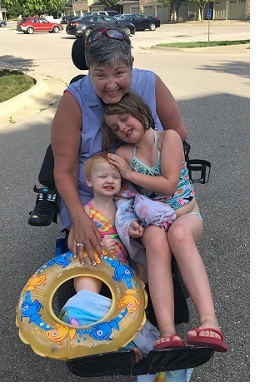 Deb Young likes to take on new challenges. "If I had to trade what's happened to me in the last four-plus years in order to get my old life back, I'd say 'No, thanks,'" she commented.
Deb Young likes to take on new challenges. "If I had to trade what's happened to me in the last four-plus years in order to get my old life back, I'd say 'No, thanks,'" she commented.
What happened to Young in October 2013 was a head-on auto collision with a wrong-way driver. Originally given a zero chance of survival, she beat the odds, but lost both of her legs and her left arm. Yet she considers her survival itself a success story and focuses on what she gained.
"Never in my wildest dreams could i imagine all the wonderful people I've met because of the accident," she said. "I've been exposed to so much that I didn't even know existed before. And being on stage with Laughing Feet [an inclusive performance group in Wichita] was the best night of my life!"
As a member of the DHP's Consumer Advisory Board, Young is excited about spreading the word that Kansans with disabilities can be healthy. During her reign as Ms. Wheelchair Kansas 2017, her platform was "Disability Does Not Promote Dependence." It was a natural fit for her to share information about the DHP's healthy living programs when she met with people around the state.
Young, who lives in Lawrence, embraces the DHP's emphasis on physical activity. She credits swimming therapy for making her stronger and she also rides horses with Freedom Hooves Therapeutic Riding Center in Wichita. For one of her Ms. Wheelchair Kansas events, she hosted a wheelchair yoga session.
Before her injury, Young was regional director of special education for Greenbush, a nonprofit that serves schools. "As a special educator in my career, I thought I knew a lot about disability. But this whole situation opened my eyes to more than I could ever conceive," Young said, noting that she continues working with children.
"I can still keep up my career on my own terms - with no politics!" she laughs. She consults with one former client, a psychiatric residential facility, making sure children can still get their schooling while in care, and volunteers at two elementary schools in Lawrence, which gives her a chance to eat lunch with her granddaughter.
The kindergartners are curious and helpful - one child taught her how to dribble and shoot a basketball - and Young especially appreciates their honesty. "I have to be honest about who I am and stay challenged," she said. "Just don't tell me what I can't do, because I will do it!"
Pictured: Deb Young with her granddaughters Eloise and Lilian
Stoplight Healthy Living Program a "Go" for Consumers
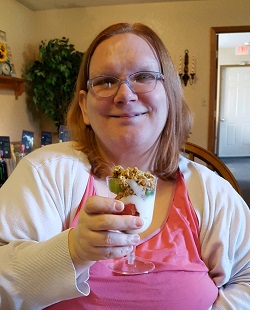 Seven individuals at SLI in Topeka have completed the Stoplight Healthy Living Program, which teaches people with intellectual and developmental disabilities ways to improve their nutrition and increase their physical activity.
Seven individuals at SLI in Topeka have completed the Stoplight Healthy Living Program, which teaches people with intellectual and developmental disabilities ways to improve their nutrition and increase their physical activity.
DHP staff Dot Nary and Kim Bruns delivered the pilot program, which met once a week for six weeks at the group home site. The five men and two women participants learned how to use a Stoplight method for choosing the foods they eat. In this approach, foods are assigned to color groups that remind the user how often to eat them: Green means "go" (eat often), yellow means "slow" (eat sometimes) and red means "whoa" (eat rarely).
The participants learned about the role of portion sizes and eliminating sugary drinks to eat healthier, how to choose healthy foods when eating out, and ways to increase their physical activity. They also discussed how other people can help them stick with their new, healthier habits. The participants worked with the group home staff to make changes, such as buying whole wheat bread instead of white bread, offering sugar-free snacks, and serving water or milk with meals instead of soda.
The DHP plans to conduct the program at one more group home, then develop a training so others can deliver the Stoplight Healthy Living Program to Kansans with IDD around the state.
Pictured: A participant shows off the healthy snack she created using yogurt, fruit and granola.
How's Your Health Care Access? CHEC Informs Consumers and Providers
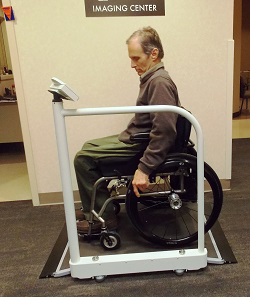 Last fall, the DHP partnered with five Kansas centers for independent living (CILs) to take a closer look at health care access for consumers in their communities.
Last fall, the DHP partnered with five Kansas centers for independent living (CILs) to take a closer look at health care access for consumers in their communities.
Staff members from the following CILs performed CHEC (Community Health Environment Checklist) assessments at local health care and health promotion facilities: Independence, Inc.; Independent Living Resource Center; Prairie Independent Living Resource Center; Resource Center for Independent Living; and Three Rivers, Inc.
Each health care facility received a score for usability based on a possible 100 points. Then the assessors discussed the results with their contact persons at the medical offices,dental office, and vision clinic that they assessed.
The good news: Several of the clinics made changes promptly - one installed a reception counter that is less than 26 inches high - and others committed to make changes including widening the only accessible parking space.
The other good news: The CIL staff established relationships as disability resources with health care providers in their communities. The DHP will partner with CILs again in the coming year to conduct more CHEC assessments and develop relationships with other health care providers in their communities. For more information, see the Community Health Environment Checklist Success Story (PDF).
Pictured: CHEC assessor Bob Mikesic uses an accessible scale at the Internal Medicine Group in Lawrence.
"Feeling Good About Your Smile" Expands to Other Communities
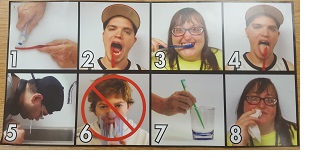 Forty-nine people with intellectual and developmental disabilities have now taken part in the DHP's "Feeling Good About Your Smile" workshop, where they learn ways to improve their oral health. Dental Hygienist Kathy Hunt developed the course and has led sessions in Parsons, Olathe and Wichita.
Forty-nine people with intellectual and developmental disabilities have now taken part in the DHP's "Feeling Good About Your Smile" workshop, where they learn ways to improve their oral health. Dental Hygienist Kathy Hunt developed the course and has led sessions in Parsons, Olathe and Wichita.
To expand the program's reach, Hunt also trained two registered dental hygienists, Stormy Morrison in Great Bend and Lesley Johnson in Pittsburg. Morrison has already led one workshop in Garden City, and these trainers can now teach more Kansans with IDD how to keep their teeth, gums and mouth healthy.
In immediate post-tests of participants, attendees improved their oral health knowledge after the training, such as understanding the benefits of drinking water instead of soft drinks and knowing which foods were more likely to cause cavities.
In a follow-up evaluation with participants from the first workshops last year, all of the respondents said they are using the mirror cling they received in the training (see photo), which illustrates the correct steps for tooth brushing. See the Feeling Good About Your Smile Success Story (PDF) for more information.
Have You Liked Us on Facebook?
 Join us in conversation on the Kansas DHP Facebook Page. Just look for the Kansas Disability & Health Program. We share tips related to a healthy lifestyle, focusing on physical activity, oral health and nutrition.
Join us in conversation on the Kansas DHP Facebook Page. Just look for the Kansas Disability & Health Program. We share tips related to a healthy lifestyle, focusing on physical activity, oral health and nutrition.
Look for Us in Person
DHP staff will present at various meetings and conferences in 2018, including the Self Advocate Coalition of Kansas (SACK) conference in June and the Kansas Disability Caucus in August. Please let us know if we can present information about our program at an event in your area.
For More Information
Kim Bruns, DHP Program Coordinator
kbruns@ku.edu
The University of Kansas
Institute for Health and Disability Policy Studies
1000 Sunnyside Ave.
Lawrence, KS 66045
This newsletter was supported by Grant/Cooperative Agreement Number DD000006 from CDC, National Center on Birth Defects and Developmental Disabilities, Disability and Health Branch. Its contents are solely the responsibility of the authors and do not necessarily represent the official view of CDC, NCBDDD, Disability and Health Branch.